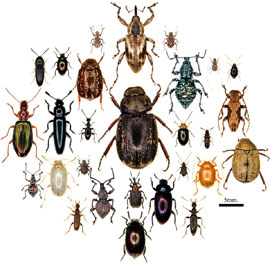Farming in the rainforest can preserve biodiversity, ecological services
Farming in the rainforest can preserve biodiversity, ecological services
mongabay.com
March 5, 2007
While conversion of tropical forest for agriculture results in significant declines in biodiversity and carbon storage, an analysis of Indonesian rainforests shows that farming cacao under the partial shade of high canopy trees can provide a way to balance economic gain with environmental considerations.
The paper, published online in the early edition of PNAS by Ingolf Steffan-Dewenter and colleagues, found that while income is maximized by total removal of the forest canopy, cacao farming under a partially thinned canopy maintains species diversity and reduces environmental impacts.
“We found that a soft intensification of agroforestry that decreases canopy cover by shade trees from 80% to 40%, will double the farmers’ income while leaving biodiversity and ecosystem services on a similar level,” Dr. Teja Tscharntke, a co-author of the paper and a professor of agroecology at University of Goettingen, told mongabay.com. “This is an example of a win-win or small loss-big gain situation that we need more to identify sustainable conservation strategies.”
 30 most common beetle species in cacao agroforestry system in Sulawesi, Indonesia. Cacao agroforestry may provide an environmentally sound land-use strategy in the tropics and potentially help preserve biodiversity. Image credit: Merijn Bos. |
The researchers say that while the environmental payoffs of shade-grown cacao are evident, economic incentives are needed to encourage this style of farming. They note that premium “shade-grown” coffee could serve as a model to generate higher income for farmer using agroforestry techniques. Steffan-Dewenter and colleagues add that education and awareness campaigns could further the cause.
“Encouragement of cultural preferences for shaded cacao agroforestry systems and education of local farmers about unappreciated ecosystem services provided by shaded systems could further promote the implementation of certification schemes,” the authors write. “Such market-based incentives will crucially determine whether shaded agroforestry systems remain important refugia for tropical biodiversity and sources of essential ecosystem services.”
“These findings are the result of fruitful collaboration among ecological and socioeconomic groups and among Indonesian and German researchers,” added Tscharntke. “The key was to identify the drivers and effects of land use. From this we were able to develop concepts of sustainable land use.”
The research was conducted at the margins of Lore Lindu National Park (LLNP) in Central Sulawesi, Indonesia. Sulawesi, an island east of Borneo and northeast of Bali and Java, has high levels of endemic biodiversity which is increasingly threatened by deforestation.
CITATION: Steffan-Dewenter, I. et al (2007). Tradeoffs between income, biodiversity, and ecosystem functioning during tropical rainforest conversion and agroforestry intensification. PNAS Early Edition. March 9, 2007.
Related Articles
Small farmers good, big farmers bad for forest conservation say researchers. Researchers presenting today at two symposia at the Ecological Society of America meeting in Memphis, Tennessee argue that the rural farmers are not necessarily at odds with efforts to preserve biodiversity in developing countries. Citing case studies in Brazil, Mexico, and other tropical areas, University of Michigan researchers John Vandermeer and Ivette Perfecto suggest that peasant farming practices encouraged by grassroots movements may actually support conservation, while activities by wealthy landowners often undermine it.
Saving the Amazon Rainforest Through Agricultural Certification. John Cain Carter is a Texan rancher who owns 20,000 acres (8100 hectares) in the Brazilian state of Mato Grosso and who has an unlikely relationship with the forest and its protectors. He believes that landowners, despite being held in low regard by environmentalists as the production of Brazilian beef and soya is currently the main threat to the rainforest in this region, may be the potential saviors of the rainforest. Carter, among other somewhat environmentally-conscious, yet profit-oriented landowners, wants to promote responsible agricultural practices by encouraging consumers to provide incentives to growers and producers.
Starbucks, Earthwatch team up to improve eco-friendly coffee. Earthwatch Institute, a leading environmental volunteering organization, and Starbucks Coffee Company announced they will team up to support environmentally-friendly coffee plantations in Costa Rica.